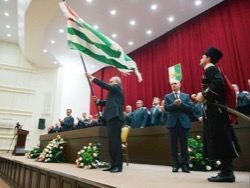
In Venezuela, new protests were held against the government of President Nicolas Maduro. This was the reaction of the opposition to the promise of the electoral Commission to block the referendum process against the power of the leader of the country. Judging by the reaction of the President, the conflict in the recession will not go.
The protests organized by the opposition bloc the “Roundtable of democratic unity”. During the campaign, thousands of people filled the streets of many cities of the country, demanding a referendum on the resignation of President Nicolas Maduro in 2016. According to TASS, mostly the action took place without major incident, apart from the March on Margarita island. There was a clash with opposition activists by supporters of the current socialist government.
Earlier in September, have already been organized opposition action with the requirement to assign an exact date for the referendum. The President called it “a storm of Caracas” and accused the U.S. of staging a coup.
Then the Minister of foreign Affairs of Venezuela Bernardo Alvarez Herrera said that in this way the administration in Washington led by Barack Obama aims to realize its “imperialist plans against the peace and development of peoples.”
However, not only the United States supports the opposition bloc in its intent to seek a referendum on the impeachment of the President. Spanish foreign Minister after the “storm of Caracas”, said that he supports the Venezuelan people and his desire for a peaceful solution to the conflict, and believes that the action will trigger an open dialogue between the opposition and the government. The same position is held and the head of diplomatic missions of Argentina, Brazil, Chile, Paraguay, Mexico and Peru, who put their signatures under the document on the referendum.
But peace negotiations followed, and in late September, the national electoral Council of Venezuela stated that the referendum cannot be held until the end of 2016, despite the fact that the opposition managed to collect the required number of signatures in the first stage, in support of the referendum.
The second stage of collecting signatures is already scheduled for October 26-28, in which the opposition bloc will need to raise about 4 million signatures of members of electoral lists. As expected, most of the collected signatures to the election Commission rejects.
The decision of the electoral Commission to sabotage the referendum exacerbated the situation. For the opposition, the most important factor is the holding of this vote before the end of 2016. If the plebiscite will be held after 10 January 2017, the re-election of the President, under the Constitution of Venezuela, will be carried out immediately, but only in 2018. All this time the presidency will temporarily occupy Vice-President Jorge arreaza, the closest ally of Maduro.
“The decision of the people”
It was after the decision of the electoral Commission to block the referendum process “Roundtable of democratic unity” urged his supporters to come out on October 12 protest.
Nicolas Maduro has responded very strongly to such a call by the opposition and called the leadership of the Round table “leaders of the evil forces in Venezuela.” He also reiterated that no referendum will be.
“Maduro is here and will remain here. This is not the solution to Maduro, the decision of the people, and he’s the top political leadership and a unified vanguard of the revolution,” announced the Venezuelan leader.
At the moment the Venezuelan President’s main political task is not the holding of new elections and the stabilization of the economic situation in the country.
After the fall of oil prices, Maduro was forced to introduce a rigid system of economy. Also, the country increased the level of inflation, there was an acute shortage of vital products. According to the survey Venebarometro, the Venezuelan centre for the study of public opinion, 92% of people now can’t afford enough food for their families.
The current economic collapse also contributed to the increase in the number dissatisfied with the existing political regime. 92% of citizens are dissatisfied with the situation in the country, 57% of respondents assess the economic situation as “very bad”.
According to Emil Dabagyan, a senior researcher of the Institute of Latin America of Russian Academy of Sciences, the opposition in the end will be able to seek a referendum. It is not satisfied with those concessions, which is ready to go Maduro.
“Recently, the President invited the opposition to abandon the referendum, in return, he promised them the release from prison of those there for political reasons. However, the opposition did not accept this proposal Maduro,” he said.
The conflict between the Maduro and the right opposition is exacerbated by the fact that the President has already lost the majority in Parliament. It now controls the opposition, however, controlled by Maduro bodies resist all initiatives “rebellious” Parliament.
On 12 October, for example, the Supreme court, under the control of the Maduro, gave permission to the President of Venezuela to adopt the country’s budget by 2017, without the consent of Parliament.
USA undecided
Dmitry Rosenthal, scientific Secretary of the Institute of Latin America of Russian Academy of Sciences, noted that now the issue of a referendum is not held or not, and its date.
“For the opposition it is very important to hold a referendum before the end of 2016, then the Constitution will be new elections”, — he said.
The source “Газеты.Ru” also notes that the authorities have no illusions that Nicolas Maduro would not support the referendum, as polls show that 80% of Venezuelans in favor of change of power. “Perfectly aware of this, the authorities are trying to delay the referendum, and for that they have a legal basis, added Rosenthal. — The procedure of the referendum and its timing is not clearly enshrined in the Constitution. And so it is possible to delay very long.”
According to the expert, “both sides have strong and irreconcilable differences, no one is willing to make concessions”, so the chances of a referendum before the end of 2016 are very small. “This will be possible only if they are constantly repeated mass actions,” added Rosenthal. However, mass action to untie the hands of Maduro, who has repeatedly stated that the opposition activists are going “against the will of the people” and funded by the US and forces of “global capital”.
Regarding the US role in the Venezuelan conflict, Rosenthal believes that the real goal of Washington is difficult to understand, because now most of the political statements are mere rhetoric and it is hard to say what it is.
“The U.S. would like to obtain more predictable government in Venezuela, but there is no reason to believe that the American government is sponsoring the opposition — said the source “Газеты.Ru”. — Most US position themselves peacemakers, calling for fair referendum”.
That Washington has not yet decided to support one of the parties to the conflict, according to meeting U.S. Secretary of state John Kerry with Maduro on September 26 in the Colombian Cartagena.
Both policies have demonstrated a willingness to make contact and discuss the best option out of the political crisis on the Venezuelan people.
The position of the Russian leadership, meanwhile, tends to support Maduro. On 10 October the President of Russia Vladimir Putin met at the energy forum in Istanbul with Maduro and discussed with him prospects for further economic cooperation. Moscow’s position is mainly due to historical reasons. Maduro is the successor to the fiery leftist Hugo Chavez, the previous leader of Venezuela. For the period of his reign was a “Golden age” of the Venezuelan-Russian relations, with a series of military and oil contracts. If the opposition can unseat Maduro, Russia will not be able to save the old relationship.








